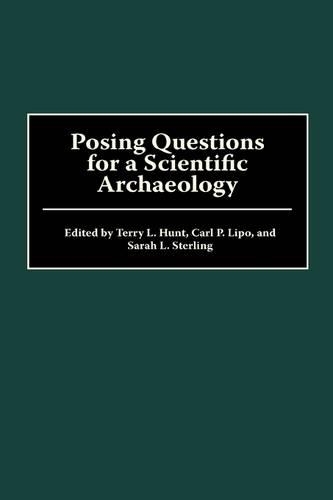
Posing Questions for a Scientific Archaeology
(Hardback)
Publishing Details
Posing Questions for a Scientific Archaeology
By (Author) Terry L. Hunt
Edited by Carl P. Lipo
Edited by Sarah L. Sterling
Bloomsbury Publishing PLC
Praeger Publishers Inc
30th June 2001
United States
Classifications
Tertiary Education
Non Fiction
Archaeological science, methodology and techniques
930.1028
Physical Properties
Hardback
328
Description
Although many believe that archaeological knowledge consists simply of empirical findings, this notion is false; data are generated with the guidance of theory, or some sense-making system acting in its place whether researchers recognize this or not. Failure to understand the relationship between theory and the empirical world has led to the many debates and frustrations of contemporary archaeology. Despite years of trying, the atheoretical, empiricist foundations of archaeology have left us little but a history of storytelling and unsatisfying generalizations about historical change and human diversity. The present work offers promising directions for building theoretically defensible results by providing well-designed case studies that can be used as guides or exemplars. Evolutionary theory, in at least some form, is the foundation for a scientific archaeology that will yield scientific explanations for historical change.
Reviews
.,."suited for professional archaeologists and graduate students."-Choice
...suited for professional archaeologists and graduate students.-Choice
A lot of work, effort, and time is involved in the doing of evolutionary archaeology. Exisiting data cannot be used to address evolutionary questions. We must learn aspects of disciplines that hold an essentialist ontology and that focus on immanent (atemporal and aspatial or universal) properties and processes. Darwinian evolution comprises a theory that, with some thoughtful work, provides explanations rather than interpretations. Doing evolutionary archaeology will be rewarding because of the theoretically founded- and thus empirically testable-conclusion that it will generate. This is a book well worth having.-Journal of Anthropological Research
..."suited for professional archaeologists and graduate students."-Choice
"A lot of work, effort, and time is involved in the doing of evolutionary archaeology. Exisiting data cannot be used to address evolutionary questions. We must learn aspects of disciplines that hold an essentialist ontology and that focus on immanent (atemporal and aspatial or universal) properties and processes. Darwinian evolution comprises a theory that, with some thoughtful work, provides explanations rather than interpretations. Doing evolutionary archaeology will be rewarding because of the theoretically founded- and thus empirically testable-conclusion that it will generate. This is a book well worth having."-Journal of Anthropological Research
Author Bio
TERRY L. HUNT is Associate Professor of Anthropology, University of Hawaii./e CARL P. LIPO is a systems architect at Intemap Network Services and Affiliate Graduate Faculty at University of Hawaii./e SARAH L. STERLING is a doctoral candidate in Anthropology at the University of Washington./e
